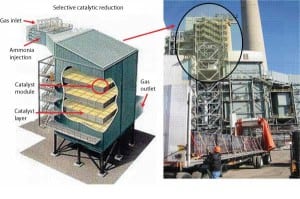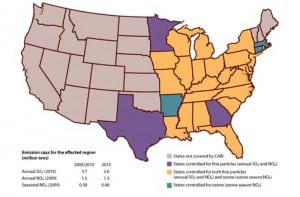COAL POWER Direct
-
Commentary
Coal Continues to Clobber Wind
Just when you thought coal was down for the count, here’s a report from London’s Financial Times. “British coal production looks set to grow for the first time since 2001, thanks to higher prices and power generators’ new-found appreciation of domestic coal supplies.” Coal production in the UK mostly has been falling since the 1950s. -
Commentary
Rules Designed to Be Broken
By Dr. Robert Peltier, PE
The fallout from the Supreme Court’s April 2, 2007, decision (Massachusetts v. Duke Energy) in which the high court ruled that the EPA does have the right to regulate CO2 emissions as a pollutant under the Clean Air Act (CAA) continues. The court also ruled that the EPA has the authority to regulate carbon emissions from automobiles and other vehicles—and, by extension, power plants (my words, not the court’s). -
Coal
Environmentally Sound Handling of Deactivated SCR Catalyst
Selective catalytic reduction systems were introduced as a means of reducing the nitrogen oxide emissions of power generators in the 1980s. Since then, environmental issues have increased in importance, as has the value of an SCR reactor. Unfortunately, because this technology is still so new, not all users understand its full potential and proper maintenance techniques.
-
Coal
Trona Injection Reduces SO3 Emissions
Emissions of SO3 (or its hydrated form, H2SO4) have created a nagging problem for some coal-fired power generators after they’ve installed a selective catalytic reduction system. If your plant is in that unfortunate group, here’s a summary of the state of our understanding of the problem—and its solutions.
-
O&M
How to Measure Flyash Levels
Measuring the level of flyash in your silos is not an easy task, in part because the flyash collected at one plant can be remarkably different from that collected at another plant, even if both fire the same coal. Such variability means that selecting the right instrument for your application is important.
-
Coal
Court Kicks CAIR Rules to the Curb
A federal appeals court has struck down a key Environmental Protection Agency (EPA) program for reducing fine particulate and smog-causing emissions in the eastern half of the nation, saying the rules were riddled with “several fatal flaws,” including the agency’s failure to properly focus pollution cuts to prevent movement of air pollution from one state from worsening air quality in a downwind state.
-
Coal
EEI Leaders Say Promise of Carbon Capture and Storage “Overblown”
In a sobering assessment of a key technology that’s expected to help keep the coal industry viable in the face of likely greenhouse gas caps, several electric utility executives have expressed deep concern that the promise of carbon capture and storage for coal-fired power plants has been “overblown” and “oversold.”
-
Commentary
EPA Staff’s GHG Proposal Will Paralyze the U.S. Economy
The Environmental Protection Agency (EPA) has announced that is it well on its way to regulating at least 85% of the energy used in America in the name of global warming (never mind the fact that temperatures have inexplicably not increased since at least 2001). If the proposal is enacted, any organization or person that emits more than miniscule amounts of CO2 will be required to obtain a permit, effectively bringing our economy to its knees in short order.
-
Commentary
Stymied on Coal, Jacksonville Goes Back to Gas
By Kennedy Maize
Stymied in its plans for new coal-fired generation, Florida’s Jacksonville Energy Authority is moving to natural gas. . . .
For several years, JEA was heavily involved in a multiple-utility plan for a $2.3 billion, 800-MW coal-fired plant to meet the region’s rapidly-growing electricity demand. But Florida Republican Gov. Charlie Crist (rumored to be on presumptive Republican presidential nominee John McCain’s vice presidential short list) clobbered the project and imposed a 20% renewable energy mandate on Florida utilities. “I worked on that for three years. In a flash of an eye, it got cancelled,” JEA project manager Mike Lawson told the Florida Times-Union. -
Commentary
The Madness of Gore
Is Al Gore out of his mind? Or is he simply issuing a difficult challenge that he knows can’t be met, but will stimulate the country toward a positive effort?
It’s hard to tell, given his speech in Washington last week, calling for the U.S. to replace all – that’s 100 percent, folks – of its electric generation with renewables in a decade. We’re talking 2018 here.




